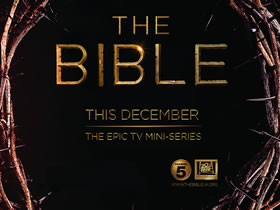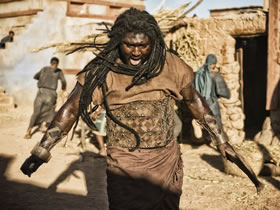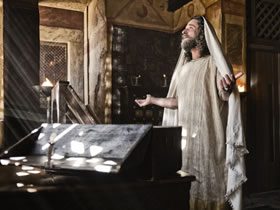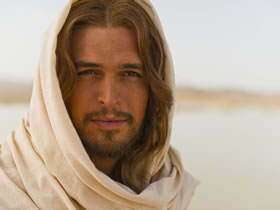Episode 1: Beginnings
From the creation of the world, through the birth of Israel and the oppression of his descendants in Egypt, to the miraculous escape through the Red Sea, we might think about the big themes of failure and freedom.
Like all great literature, the Bible explores big themes through symbolism and metaphor.
The story begins in a beautiful garden. What message does this convey?
God wants the best for us. Human beings were made to enjoy God and the wonderful world he has created. God made humans with the capacity to appreciate beauty and he encourages humanity in scientific exploration and creative enterprise.
- The Bible starts with God creating everything, culminating in human beings, whom he puts in the Garden of Eden to care for it (see Genesis 2:1–15).
- Eden means a well-watered place, suggesting beauty and abundance – a place where all humanity's needs are met.
- All Christians believe that God created the universe but they interpret the creation story differently. Some take it literally, meaning God created the world in six literal days. Others see it as symbolic language explaining why God made the universe and the amount of time is not supposed to be read literally. However Christians understand the timing of the events in Genesis, there is a clear emphasis in the account of God's intention for humanity to live in harmony with the environment, each other, and with God:
-
- 'Then the man and his wife heard the sound of the Lord God as he was walking in the garden in the cool of the day . . .' (Genesis 3:8)
- The Bible ends with a symbolic description of a recreated world, which draws on some of the imagery from Genesis:
-
- On each side of the river stood the tree of life, bearing twelve crops of fruit, yielding its fruit every month. And the leaves of the tree are for the healing of the nations. (Revelation 22:2)
What is symbolised by Adam and Eve 'eating the forbidden fruit'?
The world is not now how God intended it to be because each of us disobeys God in our own way – as illustrated by Adam and Eve. God gave us free will because he wants a genuine relationship with us rather than preprogramed robots.
- Adam and Eve were given the task of ruling over creation on God's behalf (see Genesis 1:27–28; 2:15), and had just one restriction placed on them:
-
- 'And the Lord God commanded the man, "You are free to eat from any tree in the garden; but you must not eat from the tree of the knowledge of good and evil, for when you eat from it you will certainly die."' (Genesis 2:16–17)
- Taking the fruit is an act of rebellion against God – human beings are deciding for themselves what they believe to be good or evil.
- The Bible describes this as the origin of humanity's rejection of God and his authority, which is called 'sin':
-
- When Adam sinned, sin entered the world. Adam's sin brought death, so death spread to everyone, for everyone sinned. (Romans 5:12, NLT)
We see people failing to live together or trust in God's promises, and eventually becoming slaves – then being rescued, given freedom, and a new start. What is the underlying message of this recurrent theme?
This theme is an example of an ongoing theme, which continues throughout the Bible, often referred to as a cycle of 'sin, judgement and grace'. That is, humans disobey God (sin) and there is a consequence (judgement) but God freely offers undeserved forgiveness and transformation (grace).
- After rejecting God's rule, humanity quickly becomes characterised by violence and corruption.
- God's great promise to Abraham and his descendants is one of the most significant promises in the Bible:
-
- 'I will make you into a great nation, and I will bless you; I will make your name great, and you will be a blessing. . . . and all peoples on earth will be blessed through you.' (Genesis 12:2–3)
- In the New Testament, the apostle Paul, quoting Genesis 15:6, holds up Abraham as the great example of faith:
-
- 'What does Scripture say? "Abraham believed God, and it was credited to him as righteousness."' (Romans 4:3)
- Although Abraham and his descendants repeatedly fail to live in the light of the promises, God continues to show his enormous grace to them.
- Christians believe that it is through the life, death and resurrection of Jesus that God's promise to Abraham that through his descendants all the nations of the world are blessed come to fulfilment.
What might be the symbolic meaning of Moses leading the people out of slavery, through the water, away from the forces that were out to kill them?
As well as illustrating an historical event it also shows what is on offer from God for all humans. We, too, can be led out of what Jesus called our 'slavery to sin' and set free from sin's power to destroy us. For generations, this escape through the sea has been celebrated as a defining moment in the history of God's people. Today, many Christians see this as symbolised by our own experience of passing through the water of baptism.
- Before the exodus from Egypt, God had promised that he would rescue them if they trusted him.
- This rescue, beginning with what became known as Passover, is so momentous that the people of Israel are to celebrate it every year:
-
- 'When you enter the land that the Lord will give you as he promised, observe this ceremony. And when your children ask you, "What does this ceremony mean to you?" then tell them, "It is the Passover sacrifice to the Lord, who passed over the houses of the Israelites in Egypt and spared our homes when he struck down the Egyptians."' (Exodus 12:25–27)
- Jesus and his disciples may well be celebrating this Passover rescue at the 'last supper'. New Testament writers see his death as being symbolised by the original Passover:
-
- 'For Christ, our Passover lamb, has been sacrificed.' (1 Corinthians 5:7)
What could the account of Rahab signify about the offer of freedom for all people? And what's the symbolic meaning of the red cord
Rahab's rescue demonstrates that God welcomes all people – no matter who you are, where you come from or what you have done. Many Christians see the red cord as part of a symbolic thread of God's offer of forgiveness and transformation throughout the Bible – from the blood of the Passover lamb (that gave protection from the plague) to the blood of Jesus (that provides forgiveness for all who turn to Christ).
- Despite her past, Rahab finds freedom because she trusts in God and in his people:
-
- The Lord your God is God in heaven above and on the earth below. Now then, please swear to me by the Lord that you will show kindness to my family, because I have shown kindness to you. (Judges 2:11–12)
- In the New Testament, Rahab is held up as a great example of faith:
-
- By faith Rahab the prostitute did not perish with those who were disobedient, because she had given a friendly welcome to the spies. (Hebrews 11:31)
- Rahab is a Canaanite, but she becomes incorporated into Israel (one of a number of examples of non-Israelites being included into the nation).
- Rahab's great-great-grandson was David, Israel's greatest king. Jesus was also one of her descendants.
- Rahab is saved by hanging a red cord from her window, demonstrating her faith in God. It is often seen as symbolic of Jesus's blood (meaning his sacrificial death).






